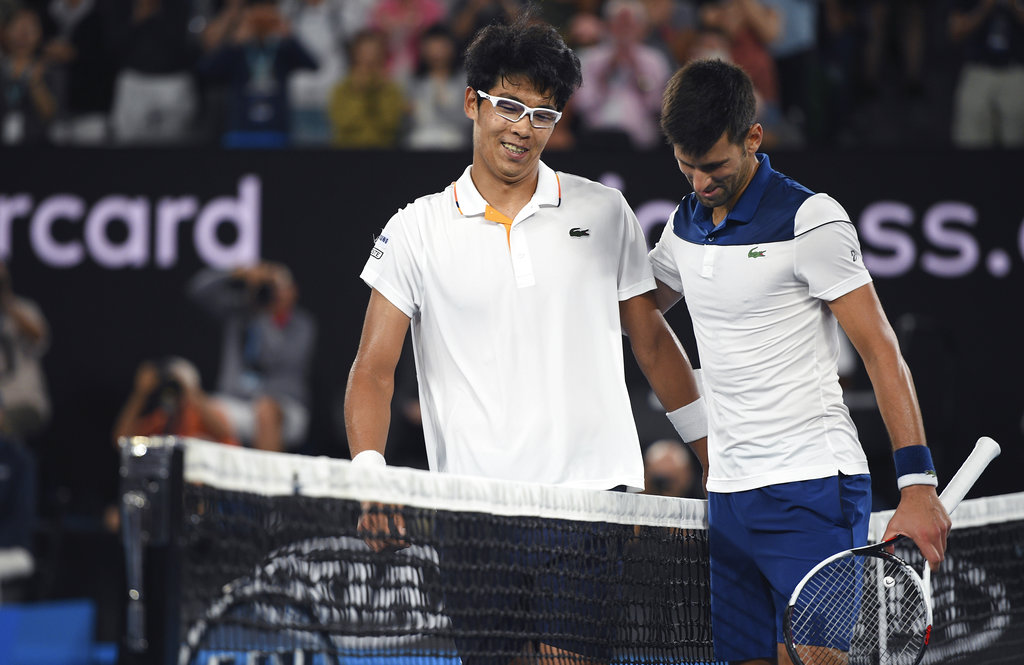
South Korea’s Chung Hyeon, left, is congratulated by Serbia’s Novak Djokovic after winning their fourth round match at the Australian Open tennis championships in Melbourne, Australia, Monday, Jan. 22, 2018. (AP Photo/Andy Brownbill)
SEOUL, South Korea — It took something unique to make tennis the center of sports attention in South Korea, where the Winter Olympics are only weeks away from opening.
Hyeon Chung’s win over six-time Australian Open champion Novak Djokovic did the trick. The headlines ran “Sensation” after Chung became the first Korean to reach the quarterfinals of a major.
The No. 58-ranked Chung beat his childhood hero on Rod Laver Arena to secure a spot in a quarterfinal against No. 97-ranked Tennys Sandgren, who had never won a match at a major until last week. So expectations are growing.
“For the Korean fans watching me live in Korea right now, I sincerely thank you for cheering me on and for watching me this late.” Chung, speaking in Korean, said in an on-court interview broadcast live. As he spoke, he looked the direction of his parents and brother who were in the crowd.
“I am still not finished in this tournament and I will show you a better performance on Wednesday.”
The mainstream media was full of praise, and social media was buzzing — former President Lee Myung-bak issued a post saying “I am supporting the ongoing challenge of the beautiful young man Chung Hyeon.”
Tennis has struggled to take off in South Korea, partly because of the expense and a relative lack of facilities and coaches.
Also missing has been a role model with success on the international stage to inspire a new generation of players. Until Monday, the best performances by Korean players came from Lee Hyun-taik, who reached the round of 16 at the U.S. Open, and Lee Duk-hee, who made the women’s fourth round at the 1981 U.S. Open.
Chung’s success could be a game-changer.
“If we have all the right support then there is the potential for Korea to produce enough good players,” Son Sung-ri, a coach who works with Chung, told Seoul’s CBS Radio. “It is good if Chung can have success and if people start to have more interest in the Australian Open and tennis in general.”
“Of course, our target is always to try and win,” Son added. “We shouldn’t count our chickens however as there is still a lot of hard work to be done.”
Djokovic was full of praise for Chung, who turned professional in 2014 and climbed 122 places in the rankings in 2015. Injures in 2017 limited Chung’s appearances but gave time to make changes to his grip and other technical adjustments.
“He definitely has the game to be a top 10 player, without a doubt,” Djokovic said. “How far he can go? That depends on him. I’m sure that he’s going to get some really good results in the future.”
The 12-time Grand Slam champion was impressed by the improvement of the bespectacled, softly-spoken Chung, who took up tennis as a boy in an attempt to improve his eyesight.
“There’s a big difference. Obviously, he’s physically stronger. I think he got some big matches in the past 15 months on the big stage.”
Chung’s previous Grand Slam best was the third round of the 2017 French Open, but he made headlines last November for winning the inaugural edition of the Next Generation ATP finals.
As well as having a great opportunity to reach the last four, Chung is making waves at home.
“Today, victory is for my country, I think tennis is coming up,” he said.